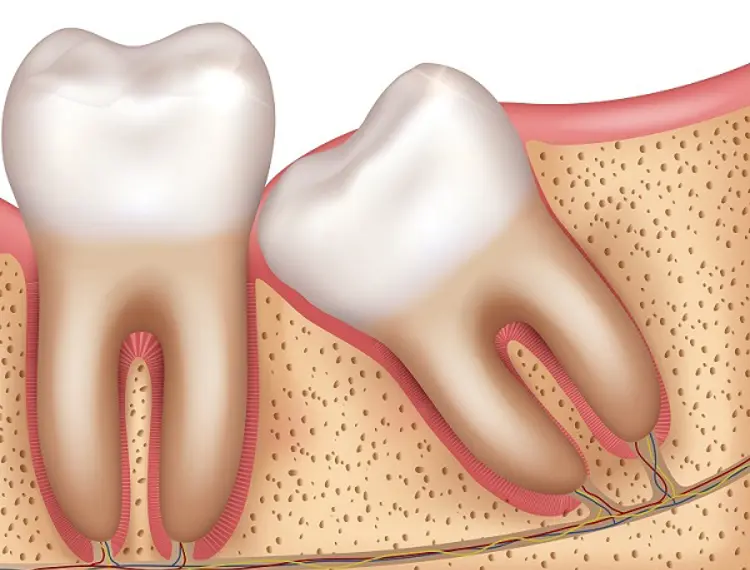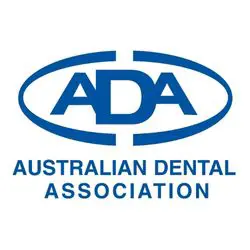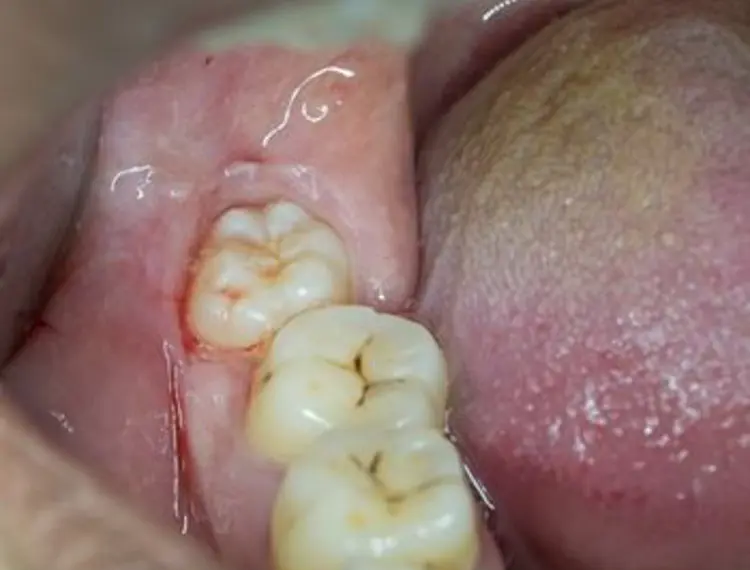
Key messages
- The third adult molar teeth are commonly called ‘wisdom teeth’.
- They generally appear around the age of 18-25 years.
- Your wisdom teeth may never or only partially appear in your mouth.
- Wisdom teeth are often impacted, meaning something is stopping them from pushing all the way into the mouth.
- It is a common treatment to have wisdom teeth removed.
The third adult molar teeth are commonly called ‘wisdom teeth’. These are usually the last teeth to appear in the mouth. They generally appear around the age of 18-25 years.
Most people will have four wisdom teeth, but they may never or only partially appear in the mouth. Some people will not develop wisdom teeth or they may have one, two or three.
You may hear of friends or family members having their wisdom teeth removed. This treatment is quite common.
How does my dentist check my wisdom teeth?
Your dentist will look inside your mouth. If they cannot see your wisdom teeth because they are still under the gums, your dentist may ask to take an x-ray. This x-ray will let your dentist see your wisdom teeth. This helps your dentist to see the position of the teeth, the shape of the tooth's roots and if the wisdom teeth are close to important parts of your face, such as nerves. If you are having your wisdom teeth removed, the x-ray helps your dentist plan this treatment.
Will my wisdom teeth cause my other teeth to become crooked?
When wisdom teeth push into the mouth, they can cause feelings of pressure. Sometimes people worry that the wisdom teeth may cause their other teeth to become crooked. There is currently no evidence that supports this theory.
Tips for cleaning wisdom teeth
When your wisdom teeth are pushing through your gums and into your mouth, it is important to keep the area clean. Not cleaning the bacteria away can cause the gums around these teeth that are only partially in your mouth to become inflamed. This is called pericoronitis.
Ensure your toothbrush reaches all the way to your wisdom teeth. Sometimes the space in these areas is limited. Using a toothbrush with a small brush head can help. Keeping your mouth closed while brushing can give you more space to reach around the cheek sides of the wisdom teeth when brushing.
If you find it difficult or painful to brush from severely inflamed gums, using an antibacterial mouthwash can help you to care for the wisdom teeth and the gums around them. But this is not a long-term replacement for brushing.
What are impacted wisdom teeth?
Wisdom teeth are often impacted, meaning something is stopping them from pushing all the way into the mouth.
For many people, wisdom teeth are unable to move from under the gums and into the mouth as the rest of the teeth do. Most people do not have enough space in their jaws for wisdom teeth to easily push through the gums. If there is not enough space, the wisdom tooth will become impacted. Impacted teeth sit under the gum or partially through the gum so only a small portion of the tooth can be seen in the mouth.
A wisdom tooth may sit on an angle that is causes it to bump into the tooth in front. This can stop the tooth it from moving into the mouth.
Impacted wisdom teeth may cause problems, including:
- infection
- pain
- cysts
- ulcers
- food can get stuck
- tooth decay can develop on the wisdom tooth or the tooth in front that the wisdom tooth is butting into.
If your impacted wisdom teeth are causing you problems, your dentist may recommend removing them.

Why are wisdom teeth removed?
There are several reasons why wisdom teeth may be removed. Reasons can include:
- the teeth are impacted
- they are at risk of developing tooth decay or gum disease
- they have tooth decay or gum disease
- the gum around the wisdom tooth has been infected multiple times
- they are affected by a cyst or tumour
- the teeth are impacted and cannot move into your mouth.
How are wisdom teeth removed?
Wisdom teeth can be removed by your general dentist or a dental specialist, such as an oral surgeon or a maxillofacial surgeon. The teeth can be removed in a dental clinic or hospital.
Similar to a dental filling, a local anaesthetic is provided to make your tooth or teeth numb. This will stop you from feeling pain when your tooth or teeth are removed.
Some dental clinics will have other types of anesthesia available. This can include conscious sedation, or general anaesthesia. During conscious sedation, medications are used help to you relax and block pain during the procedure. An example is nitrous oxide, commonly known as 'happy gas'. General anaesthesia can be performed in dental clinics but is more common in hospitals. This is commonly referred to as 'going' to sleep', for the dental treatment.
There are risks and possible complications for any medical treatments.
The risks and complications of removing wisdom teeth will be explained to you before any treatment is done.
Possible complications can include:
- damage to the nerves that travel to and supply feeling to the wisdom teeth and nearby parts of the face. This can cause feelings of numbness or 'pins and needles' in the parts of the face and mouth that these nerves give feeling to
- a dry socket
- swelling
- infection
- damage to nearby teeth.
- difficulty opening the mouth, often due to swelling
- excessive bleeding
- pain
- an opening from the mouth to the maxillary sinus (upper wisdom teeth only).
Wisdom teeth that are causing problems or are at high risk of causing problems in the future are best removed at a younger age. Removing these teeth by around age 25 is easier than doing so when you are older.
If you are having issues with your wisdom teeth, it is best to see your dentist. They can provide you with personalised advice. Visit the ADA's Find-A-Dentist service to find an ADA member dentist near you.
Depending on the difficulty of the treatment, it may be necessary to take a few days off work.
After any tooth extraction, it is best to avoid sports and exercise.
After a general anaesthetic, you cannot drive for 48 hours.



